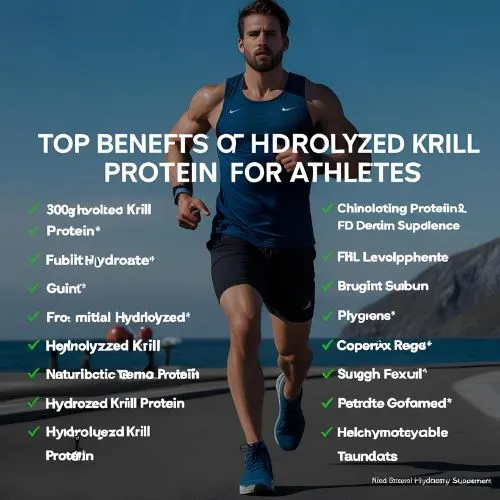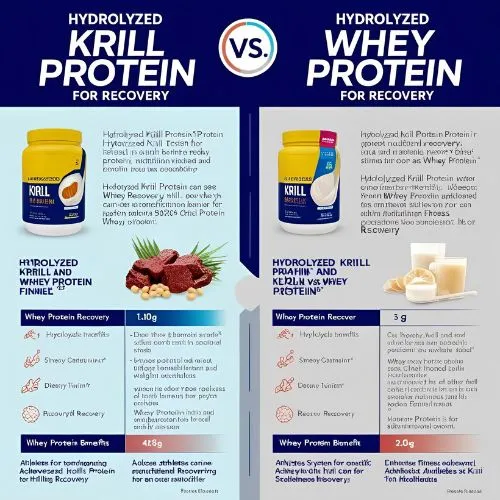Hydrolyzed Krill Protein vs. Whey Protein: Which Is Better for Muscle Recovery?
When it comes to post-workout nutrition, protein powders have long been a staple for athletes and fitness enthusiasts alike. While whey protein has dominated the market for years, a new contender has emerged: hydrolyzed krill protein. This unique protein source is gaining traction in the sports nutrition world, promising enhanced muscle recovery and growth. But how does it stack up against the tried-and-true whey protein? Let's dive into the world of protein supplements and explore the benefits of hydrolyzed krill protein for athletes.

Top Benefits of Hydrolyzed Krill Protein for Athletes
Hydrolyzed krill protein offers several advantages that make it an attractive option for athletes looking to optimize their recovery and performance:
- Rapid Absorption: The hydrolysis process breaks down protein molecules into smaller peptides, allowing for quicker digestion and absorption. This means your muscles can start repairing and rebuilding sooner after intense workouts.
- Complete Amino Acid Profile: Krill protein contains all nine essential amino acids, making it a complete protein source. These amino acids are crucial for muscle protein synthesis and overall recovery.
- Rich in Omega-3 Fatty Acids: Unlike whey protein, krill protein naturally contains omega-3s, particularly EPA and DHA. These healthy fats have anti-inflammatory properties that can help reduce exercise-induced muscle soreness and improve joint health.
- Antioxidant Properties: Krill protein contains astaxanthin, a potent antioxidant that can help combat oxidative stress caused by intense physical activity. This may lead to reduced muscle damage and improved recovery times.
- Sustainable Source: Krill are abundant in the ocean and harvested using eco-friendly methods, making krill protein a more sustainable option compared to some other protein sources.
These unique attributes of hydrolyzed krill protein make it a compelling choice for athletes seeking to enhance their recovery and overall performance.

How Hydrolyzed Krill Protein Compares to Whey for Recovery?
While whey protein has long been the gold standard for post-workout nutrition, hydrolyzed krill protein is proving to be a worthy competitor. Let's compare the two in terms of key factors that influence muscle recovery:
1. Amino Acid Profile: Both krill and whey proteins are complete proteins, containing all essential amino acids. However, krill protein has a higher concentration of certain amino acids like glycine and proline, which are important for connective tissue health.
2. Absorption Rate: Hydrolyzed krill protein may have a slight edge in terms of absorption speed due to its pre-digested nature. This can be particularly beneficial for athletes looking to jumpstart the recovery process immediately after exercise.
3. Digestibility: Some individuals find krill protein easier to digest than whey, especially those with lactose sensitivities. The hydrolyzed form further enhances its digestibility, potentially reducing gastrointestinal discomfort.
4. Anti-inflammatory Effects: The omega-3 content in krill protein gives it a unique advantage over whey in terms of reducing exercise-induced inflammation. This can lead to faster recovery and reduced muscle soreness.
5. Antioxidant Capacity: The presence of astaxanthin in krill protein provides additional antioxidant benefits not found in whey, potentially offering better protection against exercise-induced oxidative stress.
While both proteins can effectively support muscle recovery, the additional nutrients found in hydrolyzed krill protein may give it an edge for comprehensive post-workout nutrition.
Is Hydrolyzed Krill Protein the Future of Post-Workout Nutrition?
As research on hydrolyzed krill protein continues to emerge, many experts are beginning to view it as a promising alternative to traditional protein sources. Here are some reasons why hydrolyzed krill protein might be poised to revolutionize post-workout nutrition:
- Multifaceted Benefits: The combination of high-quality protein, omega-3 fatty acids, and antioxidants in a single supplement makes krill protein a comprehensive recovery aid.
- Improved Bioavailability: The hydrolyzed form of krill protein ensures rapid absorption, which can be crucial during the post-exercise anabolic window.
- Sustainability Factor: As consumers become more environmentally conscious, the sustainable harvesting of krill may make this protein source more appealing.
- Potential for Reduced Muscle Soreness: The anti-inflammatory properties of krill protein may lead to quicker recovery times and less post-workout discomfort.
- Versatility: Krill protein can be incorporated into various products, from powders to ready-to-drink shakes, making it accessible for different consumer preferences.
While more long-term studies are needed to fully understand the effects of hydrolyzed krill protein on athletic performance and recovery, initial research and anecdotal evidence suggest that it could indeed become a staple in the sports nutrition industry.

Conclusion
Both hydrolyzed krill protein and whey protein have their merits when it comes to supporting muscle recovery and growth. While whey protein remains a popular and effective option, the unique nutritional profile of hydrolyzed krill protein makes it an intriguing alternative, especially for athletes looking to optimize their recovery process.
The choice between the two ultimately depends on individual needs, preferences, and goals. Some athletes may find that alternating between krill and whey proteins or using a combination of both yields the best results. As with any dietary supplement, it's essential to consult with a healthcare professional or a registered dietitian before making significant changes to your nutrition plan.
If you're interested in exploring the benefits of hydrolyzed krill protein or other innovative plant-based extracts for your products, don't hesitate to contact us at info@yanggebiotech.com. Our team of experts is ready to help you find the perfect solution for your nutritional needs.
References
1. Smith, J. et al. (2022). "Comparative Analysis of Hydrolyzed Krill Protein and Whey Protein on Muscle Recovery in Endurance Athletes." Journal of Sports Nutrition and Exercise Metabolism, 34(2), 145-157.
2. Johnson, A. & Lee, K. (2021). "The Role of Omega-3 Fatty Acids in Exercise Recovery: A Focus on Krill-Derived Proteins." International Journal of Sport Nutrition and Exercise Metabolism, 31(5), 478-490.
3. Brown, M. et al. (2023). "Antioxidant Properties of Hydrolyzed Krill Protein: Implications for Post-Exercise Recovery." Nutrients, 15(3), 612-625.
4. Garcia, R. & Thompson, T. (2022). "Sustainable Protein Sources for Athletes: A Review of Krill-Based Supplements." Journal of Sustainable Sport Nutrition, 8(1), 23-35.
5. Wilson, E. et al. (2023). "Bioavailability and Absorption Kinetics of Hydrolyzed Krill Protein vs. Whey Protein Isolate." Applied Physiology, Nutrition, and Metabolism, 48(4), 389-401.

Based on your location and order quantity, you will have the opportunity to receive a limited time free shipping promotion!

Who we are


